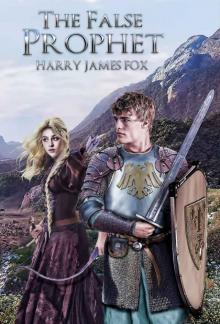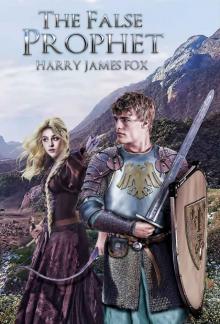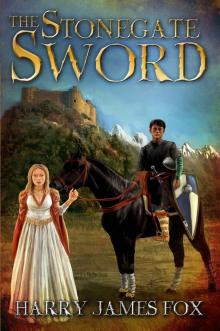- Home
- Harry James Fox
The False Prophet
The False Prophet Read online
The False Prophet
The False
Prophet
Harry James Fox
Foxware Publishing LLC
Las Cruces, New Mexico
The Black Prophet
Copyright © 2016 by Harry James Fox.
Published by Foxware Publishing LLC, 1156 Cave Springs Trail, Las Cruces, NM 88011.
All rights reserved, including the right to reproduce this book, or portions thereof, in any form. Except for brief quotations in books, articles, and critical reviews, no part of this text may be reproduced, transmitted, downloaded, decompiled, reverse engineered, or stored in or introduced into any information storage and retrieval system, in any form or by any means, whether electronic or mechanical, without the express written permission of the author, except as provided by USA copyright law. The scanning, uploading, and distribution of this book via the Internet or via any other means without the permission of the publisher is illegal and punishable by law. Please purchase only authorized electronic editions and do not participate in or encourage electronic piracy of copyrighted materials. The publisher does not have any control over and does not assume any responsibility for author or third-party websites or their content.
Scripture quotations marked (HCSB) are taken from the Holman Christian Standard Bible ®, Copyright © 1999, 2000, 2002, 2003, 2009 by Holman Bible Publishers. Used by permission. Holman Christian Standard Bible ®, Holman CSB ®, and HCSB ® are federally registered trademarks of Holman Bible Publishers. Scripture quotations marked (NIV) are taken from the Holy Bible, New International Version®, NIV®. Copyright © 1973, 1978, 1984, 2011 by Biblica, Inc.™ Used by permission of Zondervan. All rights reserved worldwide. www.zondervan.com The “NIV” and “New International Version” are trade-marks registered in the United States Patent and Trademark Office by Biblica, Inc.™ Scripture references marked (KJV) are taken from The Authorized, King James Version, The Holy Bible.
Editing by Dawn Schuldenfrei
Cover Painting by Joselito Mahilum
Cover by Jay Nathan Jore
Carla sketch by Liwen Choy
Map by Silvia Dobreva
10 9 8 7 6 5 4 3 2 1
To
My Parents
Pro libertate eos occubuisse.
(They died for liberty.)
—Suetonius Div Aug 12
Map of Stonegate
Contents
Contents
Chapter 1
Chapter 2
Chapter 3
Chapter 4
Chapter 5
Chapter 6
Chapter 7
Chapter 8
Chapter 9
Chapter 10
Chapter 11
Chapter 12
Chapter 13
Chapter 14
Chapter 15
Chapter 16
Chapter 17
Chapter 18
Chapter 19
Chapter 20
Chapter 21
Chapter 22
Chapter 23
Chapter 24
Chapter 25
Chapter 26
Chapter 27
Chapter 28
Chapter 29
Chapter 30
Chapter 31
Chapter 32
Chapter 33
Chapter 34
Chapter 35
Chapter 1
†
The Empire
In Xanadu did Kubla Khan
a stately pleasure-dome decree.
From Kubla Khan by Samuel Taylor Coleridge
Joseph Bountiful rode towards Prophet City, bearing an important message from his commanding general. The eastern heights offered a striking view. He drank in the sight of the white-washed buildings in neat rows as far as he could see. The boulevards were lined with trees, and the spires of the new temple shone with gold. The faint smell of wood smoke hung in the air. There were no city walls. Who would dare attack the Prophet’s capital, after all? It had remained safe and secure for generations.
He had been mortified when the attack on the walls of Ariel failed so miserably. His unit was more than decimated. The withering volleys of arrows, gunpowder bombs, stones, and bullets killed half his men. A blow to the rim of his helm knocked him unconscious, or he certainly would have died as well. Far better so.
He had ridden his lathered horse to the gates of the palace and was immediately escorted into the great leader’s presence. Joseph never called him “Martin Abaddon,” of course, not even to himself, though he knew the name. He kept his eyes on the Prophet’s polished boots when he handed over the message, sealed with red wax.
When his lord demanded a report, he stammered out the news. His eyes remained downcast as he blurted out the litany of failure: Failure of the guns, failure of the demand for surrender, and his personal failure to take the walls.
Leather cords cut across his face. He lifted his gaze involuntarily to see two hate-filled eyes and the bloody riding quirt in his master’s hand. “You dare come report your incompetence?” the cutting voice snarled. “You think me weak, is that it?” The voice rose to a near-scream. “I am far from weak, you coward!” The quirt slashed across his other cheek.
“Your head will roll at dawn! Take him away!”
Rough hands grabbed him and dragged him down to a dark stone chamber beneath the courtyard. They stripped him of his arms and armor. The air was heavy with smoke and the smell of must, mold, and rotten meat. Two muscular men bound his hands around a support beam and ripped his tunic from his back.
“A painless death is too good for you, coward,” snarled one. “Pain is our business.”
The cruel whip hissed though the air and cut into his back with a sharp slap. Pain flooded through him, and he groaned. But his groans turned to screams as the beating continued. They beat him until both tormentors seemed out of breath, and Joseph had lost his voice. Then they cut him down and left him in a heap on the floor.
A heavy door slammed shut, leaving him in utter darkness. His breathing was labored, but he kept mewling like a crushed kitten. He finally was able to crawl and fell forward onto a pile of straw. But sharp awns irritated his bruised and torn chest, so he struggled back to the cool stone floor. Sleep was impossible. Agony followed every movement. The crusted stripes on his back burned like hot coals, and the wounds to his spirit were no less painful. Worst of all, it was true. He had failed.
At last, a dim glow began to show at the barred window high above his head. The door flew open, and four men strode in. Torch-light flickered orange. One cuffed him with a brutal backhand, and he sprawled sideways.
“On your face,” said the man.
They whirled him expertly and his forehead hit the floor. He blacked out for a moment. When he recovered, his hands were tied behind his back, and all four men were dragging him up the stairs. His feet barely touched the worn stone steps.
He stood on a rough wooden platform in the middle of the Great Plaza. Straw slipped beneath his feet. The tight cords made his hands cold and dead. A soft kiss of cool air ruffled his dark hair. A small, curious crowd stood below him, mouths open, but he did not look at them. He gazed at the rosy glow appearing over the eastern mountains, backlighting small purple clouds. When the first gleam of sunlight sliced through the square, he would be dead. He always expected to die for the Prophet but not like this. He should be afraid, he knew. Now, numbness crowded out the fear. Strange.
As the sky grew brighter, he began to see
why the general had sent him on ahead. He would bear the Prophet’s rage, so perhaps the general might escape. Clever.
Success has a thousand fathers, but failure is an orphan. He could remember his village teacher’s words of wisdom. The old lore-man had thought them important. He should have suspected something amiss when General Logan ordered him to go on ahead to give a report to the Prophet. But at the time he had been flattered—honored, despite the shame of defeat. He understood now.
The first edge of the sun appeared. It looked like a thin streak of molten iron. He knew there would be no reprieve. He looked at the burly man with the black hood over his head. No one was there to say a prayer for him. The man motioned toward a block of wood, about knee high, stained black from previous use. He knelt before the block and laid his head upon it. I wonder if it will hurt.
Thud.
†
It wasn’t always like this. In the days of the Elders, what everyone now called the Empire had gone by a different name—and people lived a different life. It was known as America, a highly civilized, secular society. Stories said it had universities and crafts now lost and incomprehensible to the children’s children’s children of the survivors. That was a long time ago, a time before the plague hit and killed millions. It was the “Han Flu,” a serious viral infection that even the sharpest minds could not combat. That was the beginning of all troubles. And then had come the wars.
Three bouts of violence erupted as the flu survivors sought to blame someone. Was it Al-Qaeda, which had boasted about manufacturing the flu as a bio-weapon, or was it God’s judgment on a sinful nation, or were the scientists with all their knowledge to blame? No one knew. Some people of faith enraged their neighbors by insisting that they deserved the punishment and called on them to repent. Mobs hunted down those who may have been guilty of causing this horror. After the masses had hunted down the scientists, they attacked anyone who looked like Al-Qaeda; all Middle Eastern people were at risk. In the full measure of their rage, the masses next pursued people of any faith at all: Christians, Jews, and Muslims were persecuted, if not killed. Faith in God was proof of guilt. The world was lost.
Everything was destroyed so thoroughly that it took generations for people to rebuild. Medieval technology and thinking replaced the former, glorious power and knowledge of the Elder Days. Those were days when people had computing machines, self-propelled cars, and large homes. Now it was no more. Civilization had collapsed, but the survivors had gradually, heroically restored order and had progressed to a time when people rode horses, farmed land, grew their own food, and lived in a feudal, autocratic society in most towns.
Eventually, even though many Christians and some Jews remained, their persecution stopped. But fear prevented most people from expressing their faith openly, except in the free cities in the mountains surrounding the House of Healing. Other cities just east of the mountains had some freedom, but people of faith still were discreet, even though the persecutions were only a memory.
Amidst the terror, a Prophet arose, one who founded his very own cult and who wanted to form a new Empire. His ideas sounded fresh and vital and filled an emptiness in men’s souls. His name was Hiram Abaddon, a name feared by most, a name claimed to be equal to the Most High God of the universe. He was the first Prophet. His arm grew long, and he extended his reach in all directions. But there was an alliance of cities in the East that had defeated him. It kept him from achieving what he thought was rightfully his.
No one knew if Abaddon was his real name or whether he had assumed it. In the language of Hebrew, of which a few speakers survived, the name means “destroyer,” a Satanic angel. Either way, he was aptly named. In the fullness of time, Hiram Abaddon died, and his son took his place on the throne in Prophet City. The son pitted each of the various factions seeking to control him against the others. He consolidated his power and became even more ruthless than his father. He vowed to succeed where his father had failed. The son would raise a mighty army large enough to make the previous battles look like skirmishes. He would seize, and he would win. Those arrogant cities that had rejected his father would pay dearly.
The son’s name was Martin Abaddon, but all called him the Prophet. Some chose to name him the False Prophet though none would say it to his face. Few could speak his name without emotion. For some, the emotion was devotion; for some, it was loathing; and for most, it was fear.
“I will be like the Most High!” he announced to his acolytes in Prophet City. “I am the Most High, and all shall worship me!”
For twenty years, the Prophet had threatened the cities and towns that remained out of his grasp. These places lay in the mountainous areas east of Prophet City and among the remains of the Old Alliance in the eastern plains. But now, Martin most wanted to attack and conquer the cities beyond the mountains, the cities of Hightower, Longmont, and Stonegate and the villages surrounding them. He probed with his mercenaries, known as the Raiders, who terrorized outlying towns. For those within his sphere, the Raiders collected taxes and robbed granaries and herds in return for a promise of peace and the Prophet’s so-called protection.
The Raiders rode distinctive horses, well-muscled with short legs, shaggy coats, mostly buckskin or dun in color, with black manes and tails. They were not actually ponies, being much too large, but that is what they were commonly called. They were not fast but were agile and had great endurance. The Raiders were lightly armored, with short mail shirts, rounded caps of iron or leather, and oval shields, usually red and black in color. Like most men in the Prophet’s lands, they usually wore full beards as shaggy as their ponies.
The House of Healing, a medical center in the mountains, dared to profess Christianity openly, knowing the Prophet needed medical supplies from them. Christians and Jews were also found near the House of Healing in the walled towns of Ariel and Bethuel—both founded as cities following the one true God. It must be said, though, that these nearby towns tempered faith with prudence. They had paid tribute to the Prophet and had long evaded his grasp.
Martin Abaddon, Hiram’s son, came from a long line of ancestors who dabbled in the occult. His library was full of books rescued and restored from the Elder days. He coveted books on all ancient cults and pagan gods, which helped him create his own perverted religion. He also had read the Christian Holy Book, but only so he could read about those he considered his enemies—the true Christians and children of God.
Prophet City lay west of the free cities. The urban center was imposing, full of remnants of a former time, which Martin and his father had transformed into architectural feats of grandeur. Inspired by history books, Hiram had his builders copy the mosaics and dome-shaped towers of Byzantine times, creating a palace with inlaid gold, bronze, and silver and reveling in a life of excess and hedonistic pleasures. He created a new temple to be used as the center of his blasphemous religion. Parks surrounding the palace were an oasis of green, with winding brick paths edged with roses. Beds of flowers, such as marigold, aster, daisy, petunia, and snapdragon, formed checkerboards of bright color. Perfume filled the air, and buzzing bees blended with birdsong from groves of poplar, maple, and weeping willow.
Like his father, each week Martin would appear on a balcony on the temple façade and address the faithful crowds, giving them his blessing. Children would line up to receive gifts. Most were brilliantly wrapped sweets, but a few always contained coins. Each day some lucky child would receive a gold piece worth months of wages for a working man. His words were sweet and pleasant, and for many, their devotion was real. But a minority still clung to the faith of their fathers, though they were forced to worship in secret.
The palace housed his fifty beautiful wives, and he abducted women from other towns to join his harem of concubines. Physically, Martin was imposing and unnaturally strong, endowed with extraordinary good looks, charisma and charm. About forty years old, he was, nevertheless, at
the peak of his physical prowess. Long, black hair framed his olive-skinned face, tanned from spending time in the sun around his many swimming baths. Dark black-brown eyes peered out from long black lashes, flashing with warmth or anger depending on his fluctuating moods. A thin black moustache complimented his full lips, under which he wore a closely trimmed black beard. He led many an innocent girl into a state of euphoric romance and twisted love.
But the most important thing to the Prophet was his army and his mercenaries, the Raiders, and the power they represented. His goal was simple. He wanted to conquer and control what was left of the world—what was left of the Empire. In his youth, he had won his spurs in battle, but now he let his generals command in the field. He found it frustrating to work through underlings, but he could not be everywhere at once.

 The False Prophet
The False Prophet The False Prophet (Stonegate Book 2)
The False Prophet (Stonegate Book 2) The Stonegate Sword
The Stonegate Sword